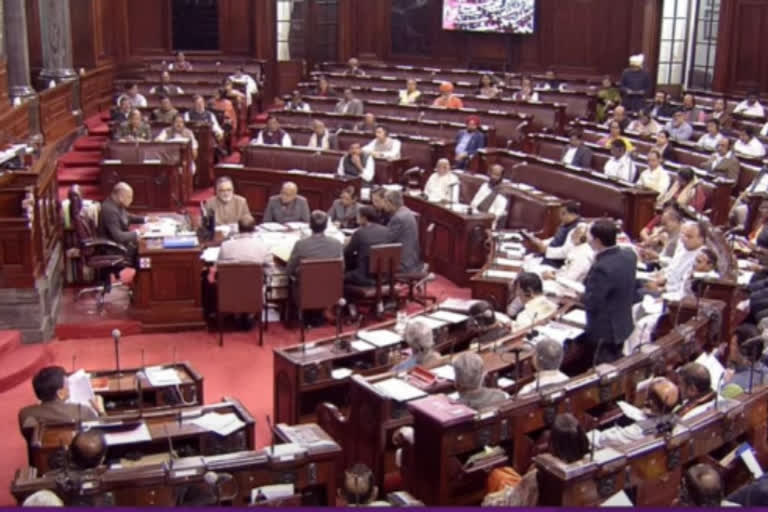New Delhi: Opposition members in the Rajya Sabha on Thursday said the government should take a holistic approach by coordinating across various ministries and bringing agencies together to tackle the effects of global warming.
Tiruchi Siva of the DMK, Pramod Tiwari of the Congress and Sandosh Kumar P of the Communist Party of India (CPI) raised a "short duration" discussion in the Upper House of Parliament on the serious effects of global warming and the need for remedial steps to tackle those. Initiating the discussion, Siva said global warming is threatening not just India but the entire planet and humanity, and it is time for collective action.
"What is looming above our head is alarming and threatening. I feel that it is not the prerogative of only the Union government, but it is also of the state governments, it is also of the private sector, and it is also of civil society. Everyone in the country, we have our own responsibility," he said. Siva said it is not the sole responsibility of the environment ministry but it has to coordinate with other ministries such as agriculture, urban development, and industries so that a holistic approach is taken as activities in each of these areas have a consequence on the environment.
He also voiced concern over a "recent EIA (environment impact assessment) notification, the Environment Protection Act, the Water Act, the Forest Conservation Act and the Biodiversity Act", saying "all these will result in degradation of the forest. Only protection and extending the forest will save the nation, save the world, save humans".
Expressing concerns over the possibility of many states suffering from more droughts while others being impacted by frequent cyclones and coastal areas facing a threat from rising sea levels, Siva said, "stronger guidelines" are needed from the ministry. Taking part in the discussion, Amee Yajnik of the Congress reiterated the need to enhance India's usage of renewable and clean energy and reduce dependence on fossil fuels while increasing forest cover to meet the net zero target set for 2070.
"All these require a holistic approach. You need to bring all these policies together. Unless and until we do not bring a coordinated effort to bring all these agencies together to have an approach to see that we bring down net zero, this will not fructify," she asserted. Jawhar Sircar of the Trinamool Congress (AITC) said climate change affects the coastal states of the country the most as one of the most immediate effects is the rise in sea levels.
He also expressed concern that the heatwave witnessed from mid-April has led to 5 percent less wheat procurement, while the delayed monsoon that followed has led to a lesser yield of paddy crops. Kavita Patidar of the Bharatiya Janata Party (BJP) cautioned that the melting of glaciers and wildfires are becoming frequent in different parts of the world due to climate change, while the rising sea levels are threatening many coastal cities.
She said there will be dire consequences unless corrective steps are taken to protect the environment while pointing out that climate change also has its impact on the economy. Sanjay Singh of the Aam Aadmi Party (AAP) suggested starting work on linking rivers to bring a permanent solution to floods and droughts in the country.
Citing a Climate Transparency report, Singh said between 2016 and 2021, India lost harvest on 3.6 lakh hectares of land due to natural disasters. This year, 32 of the 35 districts in Assam and 76 percent of the population in Bihar faced floods. The government had to release Rs 8,068 crore from the emergency relief fund and Rs 17,743 crore from the disaster relief fund to the states in 2020, the AAP leader pointed out.
Amar Patnaik of the Biju Janata Dal (BJD) suggested the government relook into the Disaster Management Act and make changes according to new challenges. He said many of the climate changes are irreversible disasters, not like cyclones that will go away and floods that will be over. S Niranjan Reddy of the YSRCP said India is more vulnerable to global warming and states such as Andhra Pradesh on the eastern coastline are facing a greater risk than those on the western coast.
He also said the world is moving towards a climate fund, where the developed countries have larger contributions for pollution and pay towards climate funds, which are used to mitigate the impacts in lesser-polluted countries. "In India, some states have a higher level of industrialization and much more levels of revenue collection and also contribute to pollution and warming within the country," Reddy said, adding that if India opts for such a fund, then the richer states should contribute a little more.
K Keshava Rao of the TRS said India is ranked number four on the list of countries most affected by such factors, adding that 10 developed countries account for two-thirds of the emissions worldwide while India contributes only three percent. A D Singh of the Rashtriya Janata Dal (RJD) said the government should take steps to promote alternative energy sources such as setting up parks to harness tidal energy, wind energy and geothermal energy.
John Brittas of the Communist Party of India (Marxist) said the world is paying the price of the greed of human beings and developed nations. The developed countries that had started industrialization wanted to thrust certain standards on us and at the same time, they are not prepared to shoulder the responsibility of their cumulative guilt, he added.
Sudhanshu Trivedi of the BJP pointed out that in the last 100 years, the average temperature of the planet has increased by one degree Celsius and the last 35 years have seen the five hottest summers. (PTI)



